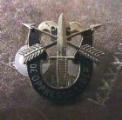I set down with my fiance recently to watch a little TV. As I was surfing the Netflix menu the new series from the creators of "Lost" about an alien occupation of Los Angeles looked interesting. Turns out it is.
Strong cast, good writing, and a focus on the human storyline rather than that of the aliens, so a story one can relate to.
About half way through the third episode - after the audience is completely drawn in and supportive of the plight of the average citizen, the moral quandary of sorting out issues of survival, family, submitting to the rule of law, or supporting or participating in illegal challenges to the government formed by the invaders - I turn to Holly and say, "you realize this entire series is an analogy for the US occupations of places like Afghanistan and Iraq, right?"
So I explained. When a stronger power imposes itself onto a weaker one, and then stays to create and sustain a new government that draws its legitimacy from the invader, rather than from the invaded, it triggers fundamental human nature based responses, and certain roles are automatically created.
There is the invader. fundamentally illegitimate. The very presence creating a resistance affect in the population affected by their actions. The intentions of the invader are not clear in this case, but good intentions only shape the degree and character of the resistance, but resistance itself is a presumptive effect.
There are the collaborators. There will always be those who see opportunity in external disruption of existing power structures to attain power and wealth that otherwise would have gone to others. These collaborators rationalize their actions as being pragmatic. To resist is futile, why not go along to get along?
There are the resistance. A bold few will act out directly. These are the guerrillas. More will support in more indirect ways. These are the underground. Many will morally or tacitly support resistance, perhaps even as they work with the collaborators. These are the auxiliary.
Lastly, there are those caught in the middle. This is probably the majority. Those who are largely apolitical and are simply trying to survive regardless of who is in power.
The twist in this show is that the audience immediately identifies with and builds empathy for the resistance. But in Vietnam, in Afghanistan, in Iraq, this was not our role. We were, we are, the alien invader. That faceless entity employing superior technology and power to impose our will onto others. We too build local security forces, employ drones to spy and kill, and disregard rights of justice we see as fundamental in the US Bill of rights in our hot pursuit of the terrorists of the resistance.
I have only watched a handful of episodes, but I recommend this show as an excellent primer for those interested in expanding their understanding on the nature of resistance insurgency warfare against an illegitimate external presence; and revolutionary insurgency illegal democracy against the governmental structure and collaborators who man them.






 Reply With Quote
Reply With Quote

Bookmarks